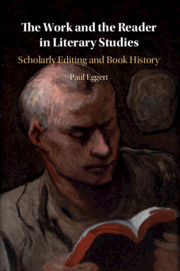Book contents
- The Work and the Reader in Literary Studies
- The Work and the Reader in Literary Studies
- Copyright page
- Dedication
- Contents
- Figures
- Preface
- Chapter 1 Introduction
- Chapter 2 Reviving the Work-Concept
- Chapter 3 The Digital Native Encounters the Printed Scholarly Edition Called Hamlet
- Chapter 4 The Reader-Oriented Scholarly Edition
- Chapter 5 Digital Editions
- Chapter 6 The Work, the Version and the Charles Harpur Critical Archive
- Chapter 7 Book History and Literary Study
- Chapter 8 Book History and Literary Study
- Chapter 9 Adaptation, Folklore and the Work
- Chapter 10 Conclusion
- Notes
- Bibliography
- Index
Chapter 6 - The Work, the Version and the Charles Harpur Critical Archive
Published online by Cambridge University Press: 19 August 2019
- The Work and the Reader in Literary Studies
- The Work and the Reader in Literary Studies
- Copyright page
- Dedication
- Contents
- Figures
- Preface
- Chapter 1 Introduction
- Chapter 2 Reviving the Work-Concept
- Chapter 3 The Digital Native Encounters the Printed Scholarly Edition Called Hamlet
- Chapter 4 The Reader-Oriented Scholarly Edition
- Chapter 5 Digital Editions
- Chapter 6 The Work, the Version and the Charles Harpur Critical Archive
- Chapter 7 Book History and Literary Study
- Chapter 8 Book History and Literary Study
- Chapter 9 Adaptation, Folklore and the Work
- Chapter 10 Conclusion
- Notes
- Bibliography
- Index
Summary
The distinction between document and text – the material and meaningful dimensions that give definition to one another – builds the agency of readers into the work-concept. Readers lend the work power. They give it renewed life. There is no transcendence for the work in this model but there is a phenomenology of it available.
This position affects literary studies. Bibliography and book history can usher us towards a long view of the life of works, in which our own readerly role in the present is affirmed. Our moment is now and we want to grasp the work, to internalise it and to assess it. Given the trajectory of works across time, access to versions of works is necessary. Chapter 6 argues that, contrary to scholarly editors’ usual belief, all work-editing is versional, whether based on intention, social-reception or documentary principles. This is because emendation is inevitable.
A practical testing of this understanding in a digital project that puts archival–editorial and work–version relationships into play is then described: the Charles Harpur Critical Archive (charles-harpur.org).
Keywords
- Type
- Chapter
- Information
- The Work and the Reader in Literary StudiesScholarly Editing and Book History, pp. 93 - 107Publisher: Cambridge University PressPrint publication year: 2019

